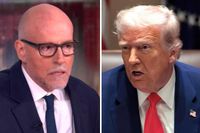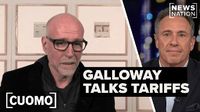On April 11, 2025, Scott Galloway, a prominent podcaster and academic, made a striking appearance on ABC's The View, where he expressed his candid views on President Donald Trump's tariff plan and the ongoing trade war with China. Galloway's commentary was both animated and critical, as he laid out the potential repercussions of Trump's economic strategies on the American economy and its global standing.
During the discussion, Galloway asserted that Trump’s decisions have already inflicted damage on the economy, with ripple effects expected to persist for years. When asked by Whoopi Goldberg about the current state of affairs, Galloway responded, "It would be hard to think of a more elegant way to reduce prosperity this fast." He emphasized the potential financial burden on consumers, warning that if the tariffs remain in place, the price of an iPhone could soar from $1,000 to an astonishing $2,300. He elaborated that manufacturing an iPhone in the United States would cost around $3,500, a significant increase compared to its current production costs in China.
Galloway's insights extended beyond mere pricing; he highlighted a broader economic concern. He warned that Trump's tariff policies could lead to a global shift in supply chains, stating, "the entire world re-routing their supply chain around brand America, which quite frankly, right now is toxic uncertainty, so they can bypass a series of unpredictable, epileptic, sclerotic decisions." This remark underscores the fear that international companies may hesitate to invest in the U.S. market due to the volatility created by the current administration.
In a particularly striking metaphor, Galloway declared, "We finally need to acknowledge, we have someone at the wheel of the global economy that is blackout drunk right now." This comment, although ironic given Trump’s well-known sobriety, encapsulated Galloway's view that the administration's erratic decision-making is detrimental to economic stability.
Galloway also critiqued Trump's efforts to revitalize American manufacturing. When Alyssa Farah Griffin mentioned Trump's intention to bring jobs back to the U.S. and lessen reliance on China, Galloway countered that most Americans desire "high-paying jobs," which are often not found in the manufacturing sector. He pointed out that while polling data indicates public support for the return of manufacturing jobs, fewer individuals actually wish to engage in those roles, which tend to be lower-paying and less desirable.
In a nod to historical context, Galloway lampooned Trump's nostalgic references to the late 19th century, saying, "Guess what? When we didn’t have indoor plumbing? When we had child labor? I’ll take Netflix and Novocaine." He argued that Trump's vision of returning to a bygone era is fundamentally misguided, stating, "This makes absolutely no sense whatsoever." Galloway also expressed concern about America's tarnished reputation globally, claiming that the principles of rule of law and consistency have "gone out the window," particularly referencing Trump's contentious relationship with Canada.
Galloway's commentary drew applause from the studio audience, as he emphasized the long-term implications of Trump's policies, suggesting that the economic injuries inflicted could take years, if not decades, to mend. "The injury will take years, if not decades, to heal … this could not be more stupid," he remarked, capturing the frustration many feel regarding the current economic climate.
Earlier in the week, on April 9, 2025, Galloway had a similar discussion with Chris Cuomo on NewsNation, where he reiterated his concerns about the tariffs. He described the current state of the U.S. economy as one marked by "toxic uncertainty," which discourages brands and companies from investing in the country. Galloway pointed to polling that shows a majority of Americans support the idea of bringing back manufacturing jobs, yet he noted that significantly fewer actually want to perform those jobs.
He argued that the U.S. has intentionally outsourced low-wage manufacturing positions in favor of higher-paying jobs in marketing, strategy, and services. Galloway's solution to support young Americans, particularly young men who previously supported Trump, was straightforward: "If he was serious about young men, raise minimum wage to $25 an hour." This proposal aligns with a growing national conversation about wage stagnation and the need for living wages in a changing economy.
In summary, Scott Galloway's recent media appearances have painted a stark picture of the potential consequences of President Trump's trade policies. His critiques highlight not only the immediate economic impacts but also the long-term ramifications for American workers and the country's global standing. As discussions around tariffs and trade continue to evolve, Galloway's insights serve as a reminder of the complexities involved in reshaping the U.S. economy in a globalized world.





